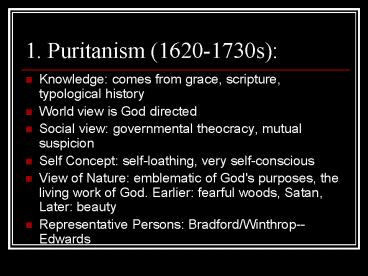1. Puritanism 16201730s: - PowerPoint PPT Presentation
1 / 12
Title:
1. Puritanism 16201730s:
Description:
Romanticism [1830-1865] Hawthorne, Poe, Thoreau, Melville, Whitman, Dickinson ... greater concern in character over action (as in romanticism) ... – PowerPoint PPT presentation
Number of Views:80
Avg rating:3.0/5.0
Title: 1. Puritanism 16201730s:
1
1. Puritanism (1620-1730s)
- Knowledge comes from grace, scripture,
typological history - World view is God directed
- Social view governmental theocracy, mutual
suspicion - Self Concept self-loathing, very self-conscious
- View of Nature emblematic of God's purposes, the
living work of God. Earlier fearful woods,
Satan, Later beauty - Representative Persons Bradford/Winthrop--Edwards
2
2. Colonialism/Enlightenment (1740s-1820)
- Knowledge Lockian empiricism, through senses and
reason - World view natural laws are discoverable, Deism
(celestial clockmaker) - Social view democracy, common man is more moral,
closer to truth, Constitution is "machine" to set
government in motion - self concept social, member of a community, be a
good citizen, social works - View of Nature mechanical, scientific, follows
laws/rules, hierarchical separation of God, Man,
Nature - Representative Persons Franklin, Jefferson
3
3. Romantic Period (1820-1860/65)
- Knowledge genius, intuition, the sublime
- World view individual directed, only know
through own mind - Social view autocracy of the soul
- Self concept self-discovery of your true self
- View of Nature organic, God, Man, Nature fused
- Representative Persons Emerson, Hawthorne
4
Romanticism 1830-1865
- Hawthorne, Poe, Thoreau, Melville, Whitman,
Dickinson - emphasis on the individual, center of
life/experience - extraordinary characters in unusual circumstances
- concentration on Nature over world alter/affected
by man -exault wild/natural, scorn the
urban/artificial - often set in distant/historic/exotic past
- importance of the imagination/intuition
5
Elements of Transcendentalism
- combines world of senses with a world beyond the
senses - triumph of feeling/intuition over scientific
reason - exaltation of individual over society
- impatience of bondage to custom and habit
- thrilling delight in nature
6
Transcendental Doctrines
- living close to nature
- dignity of manual labor
- strong need of intellectual companionship and
interests - great emphasis on "spiritual living"
- Men's relation to God personal, not
intermediation of ritualistic church - self-trust and self-reliance practiced at all
times - intense individualism
7
Philosophy and Tone of Transcendental writings
- worth of the individual
- rejection of the past, especially European
traditions - call for a new American literature
- (Insist on yourself, never imitate)
8
Critique of Slavery--some common elements of
slave narratives 1820-1865
- emphasis on family and attempts to destroy or
deny family ties - undulating hope and hopelessness
- dehumanization, animal imagery of both slave and
slave owner - preference for death rather than slavery
- power and powerlessness, often tied to food
imagery/hunger - religious/political hypocrisy of slave owners
9
Southwestern Humor 1830s-1880s
- anti-intellectual bias
- avid interest in "native" vernacular characters
- exaggeration/hyperbole often used
- interest in representing actual spoken
dialects/vernacular - often uses a Frame structure genteel narrator
vs. vernacular
10
Local Color/Regionalism 1870-1910
- folklore, local customs fading, need to be
preserved - response to complexity of day, loss of pastoral
- nostalgic
- particular regional setting
- simple, deceptive quality best work becomes
universal
11
Realism 1865-1910
- fidelity to actuality, reality as it appears
through observation - objectivity, neutrality
- social awareness, critical appraisal of
society/institutions - vernacular/dialect, spoken language
verisimilitude - greater concern in character over action (as in
romanticism) - absolute opposition to sentimental fiction
12
Naturalism 1880-1900
- attempted objectivity
- frankness
- amoral attitude toward material
- philosophy of determinism
- pessimism
- projection of "strong" characters, animal or
neurotic natures

